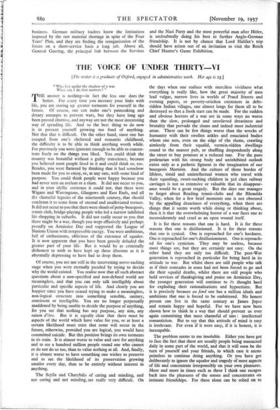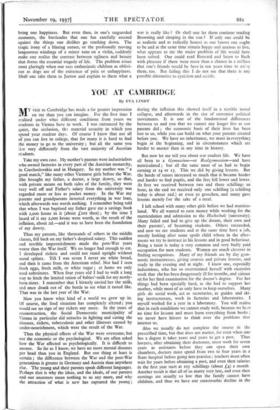THE VOICE OF UNDER THIRTY-VI
[The writer is a graduate of Oxford, engaged in administrative work. Her age is 23.]
"Who live under the shadow of a war What can I do that matters ? "
THE answer is nothing—in fact the less one does the better. For every time you increase your links with life, you arc storing up greater torments for yourself in the future. Of course, one can make one's painstaking and dreary attempts to prevent wars, but they have long ago been proved abortive, and anyway are not the most interesting way of spending life. And so the best thing to do now is to prevent yourself growing too fond of anything. Not that that is difficult. On the other hand, since one has escaped from one's sheltered and romantic childhood, the difficulty is to be able to think anything worth while. For previously you were ignorant enough to be able to concen- trate freely on the things you liked. You could think the country was beautiful without a guilty conscience, because you believed most people lived in it and could think so, too. Besides, you were flattered by thinking that it had somehow been made for you to enjoy, or, at any rate, with some kind of purpose. You could think people were happy because you had never seen an asylum or a slum. It did not occur to you, and in your idyllic existence it could not, that there were Wigans and Warringtons, Glasgows and East Ends, and all the shameful legacies of the nineteenth century, that should condemn it to some form of eternal and unalleviated torture. It did not occur to you that there were shoals of petty-bourgeois, tennis club, bridge-playing people who led a narrow inhibited life shopping in suburbs. It did not really occur to you that there might be a war, though you wept effusively and perhaps proudly on Armistice Day and supported the League of Nations Union with irrepressible energy. You were ambitious, full of enthusiasms, oblivious of the existence of squalor. It is now apparent that you have been grossly deluded the greater part of your life. But it would be as criminally dishonest to wish to have kept up these illusions as it is abysmally depressing to have had to drop them.
Of course, you are not still in the intervening nerve-racking stage when you were eternally puzzled by trying to decide why the world existed. You realise now that all such abstract questions about a non-specified and non-defined world are meaningless, and that you can only talk intelligibly about particular and specific aspects of life. And clearly you are happier since you have ceased trying to make a meaningless, non-logical structure into something sensible, unitary, consistent or intelligible. You are no longer perpetually maddened by being unable to decide the purpose of anything, for you see that nothing has any purpose, any aim, any raison d'être. But it is equally clear that there must be aspects of the world which have value for you, or at least a certain likelihood must exist that some will occur in the future, otherwise, provided you are logical, you would have committed suicide. But this position brings its own torments in its train. It is almost worse to value and care for anything and to see a hundred million people round one who cannot or do not do so too, than to value nothing at all. And, finally, it is almost worse to have something one wishes to preserve and to see the likelihood of its preservation growing smaller every day, than to be entirely without interest in anything.
The Scylla and Charybdis of caring and minding, and not caring and not minding, are really very difficult. On the days when one realises with merciless vividness what everything is really like, how the great majority of men lead vulgar, narrow lives in worlds of Praed Streets and evening papers, or poverty-stricken existences in debt- ridden Indian villages, one almost longs for them all to be destroyed so that a fresh start can be made. For the sudden and obvious horrors of a war are in some ways no worse than the slow, prolonged and unrelieved dreariness and brutality that pervade the slums and indeed most industrial areas. There can be few things worse than the wrecks of humanity with their swollen ankles and emaciated bodies whom one sees, even on the edge of the slums, crawling aimlessly from their squalid, vermin-ridden dwellings round to the nearest pub, or shuffling despondently along the street to buy potatoes at a reduced rate. For the pure proletarian with his strong body and uninhibited outlook exists only as a pathetic figment in the imagination of our bourgeois Marxists. And the culture of those hordes of lifeless, timid and unintellectual women who travel with their squealing, sweet-sucking children in 3rd class railway carriages is not so extensive or valuable that its disappear- ance would be a great tragedy. But the days one manages to forget about Reading tennis-clubs and the Rhondda Valley, when for a few brief moments one is not obsessed by the appalling dreariness of everything, when there are things that it seems worth while doing or thinking about, then it is that the overwhelming horror of a war faces one as inconsiderately and cruel as an open wound itself.
It is for these reasons that one is hard. It is for these reasons that one is disillusioned. It is for these reasons that one is cynical. One is reproached for one's hardness. One is reproached for one's disillusionment. One is reproach- ed for one's cynicism. They may be useless, because most things are, but they are certainly not easy. On the other hand they are only too difficult. The post-War generation is reproached in particular for being hard in its attitude to war. But whilst there are still people who talk as if their comrades in arms had not been forced to go and die their squalid deaths, whilst there are still people who hold services of thanksgiving and praise on Armistice Day, the younger generation will continue to thought hard for exploding their rationalisations and hypocrisies. But it is precisely because au fond one has a million ideals and ambitions that one is forced to be embittered. No honest person can live in the same century as James Joyce and remain happy and hopeful. For we have now been shown how to think in a way that should prevent us ever again committing that most shameful of sins : intellectual romanticism. But to say that this attitude of mind is easy is irrelevant. For even if it were easy, if it is honest, it is inescapable.
The problem seems to me insoluble. Either you have got to face the fact that there are usually people being massacred daily in some part of the world, and that it will soon be the turn of yourself and your friends, in which case it seems pointless to continue doing anything. Or you have got deliberately to ignore the squalor and tragedy of most aspects of life and concentrate irresponsibly on your own pleasures. More and more in times such as these I think one escapes back into the pleasures of the senses and concentrates on intimate friendships. For these alone can be relied on to bring one happiness. But even then, in one's unguarded moments, the barricades that one has carefully erected against the things one dislikes go crashing down. The tragic irony of a blazing sunset, or the profoundly moving languorous windings of a minor tune on a violin, suddenly make one realise the contrast between ugliness and beauty that forms the essential tragedy of life. The problem arises most glaringly when one sees enthusiastic children as oblivi- ous as dogs are of the existence of pain or unhappiness. Shall one take them to Jarrow and explain to them what a war is really like ? Or shall one let them continue reading Browning and sleeping in the sun ? If only one could be as realistic and as radically honest as one knows one ought to be and at the same time remain happy and anxious to live, what appears to me the major problem of life would have been solved. One could read Ronsard and listen to Bach with pleasure if there were more than a chance in a million that one's friends would be here in ten years time to en.:33r them, too. But failing this I do not see that there is any possible alternative to cynicism and accidie.

















































































































 Previous page
Previous page